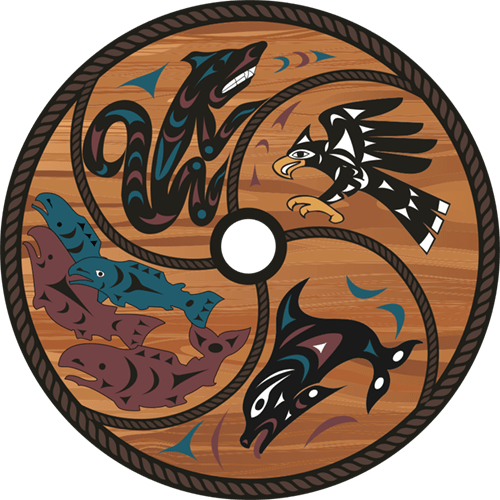What are your thoughts on the Douglas Treaty? Let us know through this survey by clicking the button below:
Transcript
ÍY¸ SȻÁĆEL SIÁM, NE SĆÁLECE J¸SITEN TŦE NE SȻÁ¸NES NÁ W̱JOȽEEP TFÁ¸ E SNÁ HIŦ ȻO ĆELAṈ EN TŦÁ¸E SNÁ ÍY¸ ŚW̱ḰÁLE ȻENEN NES AŦE ȻENTOL EṮ¸ NE ȻKIYE TIA ÁNEȻ NES ENÁ TÁĆEL E TIÁ ÁNEȻ ḰOḰEL E TŦE SYES SKÁLS. My name is J¸SITEN and I’m here in W̱JOȽEEP and as well as my name is from here, connected to that name from Ancestry. I’m happy to be here at the office today for this interview on our history, our beliefs, our ways and our sacred ways of living.
What do you think to hunt and fish as formerly meant to our ancestors?
To hunt and fish as formerly is just what I talked about. Our SḴÁLS are our beliefs and laws, the original beliefs and laws given to us by the creator. We fished and hunted and gathered food and medicines according to those beliefs and laws. To hunt and fish as formerly, that’s what it means to me, that we had our ways given to us, our ways to look after and take care and have some responsibility to those beliefs. IȽEȻSELEṈ, when you’re passing those things from one generation to the next through our SENĆOŦEN SḰÁL, our language SENĆOŦEN.
And when you talk about our hunting and fishing rights as formerly, that connects us to those places, all those islands, S₭ŦA₭, SDAYES, ṮEḴTEḴSEN, XODEȽ, I¸X̱OX̱DEŦ, and so on, all those islands, there’s more. And we say that in our prayer in the morning.
When the first settlers came around here, there was an abundance of all life here. Our people totally took care of that and were responsible for renewal of that life. Different families, each catch had some that went through the net and made it to the destination to build their families over again. There was lots and lots of fish in the W̱SÁNEĆ area, so fishing and hunting as formerly has to do with that in my mind.
Do you think that the Douglas Treaty should have economic rights in a modern context?
You know, I think that our people should be compensated for the loss of the use of our hunting places, fishing places that we maintained and looked after like we were supposed to. I think it will only be a fair, just thing to do to compensate us for those places because the way that the colonizers developed the lands and made up their laws and rules, they left us out of it, intentionally left us out of it. They tried to wipe out our histories. They tried to wipe out our language with boarding schools. They killed and punished our generations before us like my mother’s family and families before that. They took away all of their kids.
They made the laws and regulations so that the fee simple title of people on the outside of the reserve, that’s how their legal description is for lands and their title. We couldn’t be part of that system. We were on, they set aside reserve lands for us while we’re enclosed. That’s a racist law and that is still here today. And it’s caused our people to to be impoverished to the point where our young people have no place to build a house. And as the population grows around us, we have no say of what’s going on out there.
Do you feel like you should be compensated for the losses our people have endured, for the loss of protection of our inherent rights?
I pray that the leaders of Canada and British Columbia will finally become just and fair because they’re teaching our young people to be unfair, unjust. They wonder why there are so many racist people in Canada? That’s why. They have never ever been honest and truthful about how they’ve just stolen our lands and unjustly taken our places that were given to us, that we looked after the way we were supposed to. We look at the salmon runs. The beaches are polluted. The salmon runs are going nearly extinct in some cases. When we looked after it, there were bountiful amounts of everything because of the ways we lived on this place.
I’m looking forward to the day where our people get something for those losses. That’s a part of our ĆELÁṈEN that we lost. How could they pay us for that? How will they pay for all those parks, lands they call parks that they made without some kind of consultation with us?
Who would you expect to be the communal/collective voice in representing your inherent Douglas Treaty rights?
I’m here today at W̱SÁNEĆ Leadership Council Office because I believe that our leadership working together at this point and trying to find a fair just way for our people to have some of our own rights back that were just taken away. Leadership is trying to find a way to raise up our people out of the poverty level, to have some voice, actual voice in the management of these places within our homelands and territories.
So I hope that our W̱SÁNEĆ leadership can work together to find some kind of compensation or some kind of justice in the end of it all, especially for the coming generations. I have 15 grandchildren and six great-grandchildren. What will they see? Will they ever see that day of justice and fairness and that, in peace of mind? They asked us, what would you call that, reconciliation? And I said, in my mind, I call it SŦEW̱ÁŦNOṈET. SŦEW̱ÁŦNOṈET means finding peace of mind. Not just for us only, but for the settlers that are involved in all of it and the guilt that they hold as well. There’s some guilt there. I wonder how they feel when they drive by our homes, our reserves and they see the poverty when they’ve got so much.


